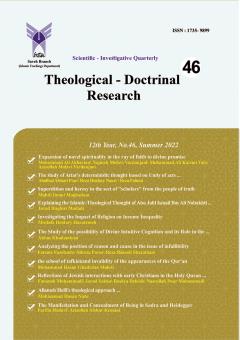-
-
List of Articles
-
Open Access Article
1 - Expansion of novel spirituality in the ray of faith to divine promise
Mohammad Ali Akhavian Najmeh Molavi Vardanjani MohammadReza KarimiVala Azizollah Molavi Vardanjani -
Open Access Article
2 - The study of Attar's deterministic thought based on Unity of acts (tawhid al-af'al (and Nearness to God via supererogatory worships (Qurb al-Nawafil)
Abolfazl Afshari Pour reza Haidari Nori reza fahimi -
Open Access Article
3 - Superstition and heresy in the sect of "scholars" from the people of truth
مهدی ایمانی مقدم -
Open Access Article
4 - Explaining the Islamic-Theological Thought of Abu Jahl Ismail Ibn Ali Nobakhti and His Role in Consolidating the Theological Foundations of the Imams in the Age of Absence
Javad Haghiri Madadi -
Open Access Article
5 - Investigating the Impact of Religion on Income Inequality
Mostafa Heidari Haratemeh -
Open Access Article
6 - The Study of the possibility of Divine Intuitive Cognition and its Role in the Development of Humanities. According to Islamic Traditions
Abbas Khademiyan -
Open Access Article
7 - Analyzing the position of reason and cause in the issue of infallibility
Fateme Fazelzade علیرضا پارسا Reza Rasooli Sharabiani -
Open Access Article
8 - The Study of the possibility of Divine Intuitive Cognition and its Role in the Development of Humanities. According to Islamic Traditions
Mohammad Hasan Ghadrdan Maleki -
Open Access Article
9 - Reflections of Jewish interactions with early Christians in the Holy Quran based on historical sources
Fatemeh Mohammadi جواد سخا Boshra Delrish نصراله پورمحمدی املشی -
Open Access Article
10 - Allameh Helli's theological approach (Background, innovation and its transformation in Imami theology)
Mohammad Hasan Nade -
Open Access Article
11 - The Manifestation and Concealment of Being in Sadra and Heidegger
fariba hadavi عزیزالله افشار کرمانی -
Open Access Article
12 - Exploring the interaction between man and the environment in Islam with emphasis on the teachings of the Ahsan system
morteza bayat
-
The rights to this website are owned by the Raimag Press Management System.
Copyright © 2017-2026







